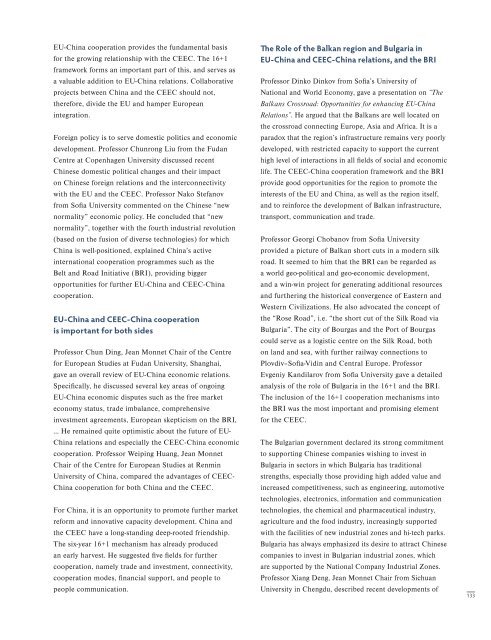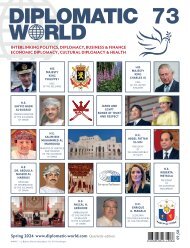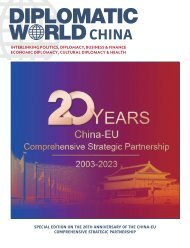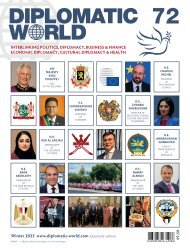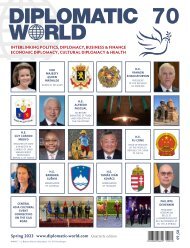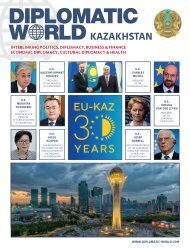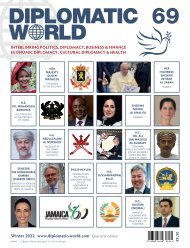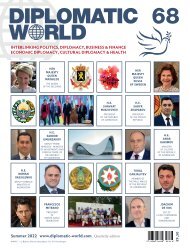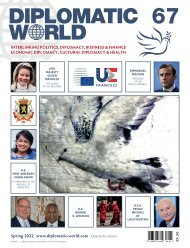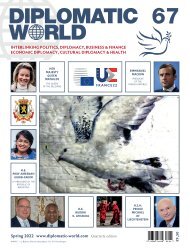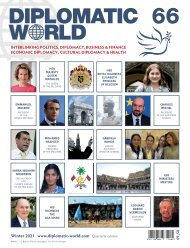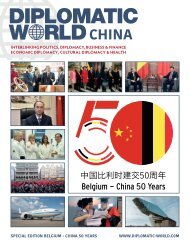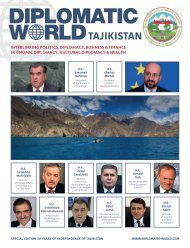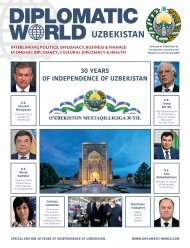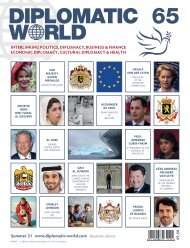Diplomatic World_nummer 57
You also want an ePaper? Increase the reach of your titles
YUMPU automatically turns print PDFs into web optimized ePapers that Google loves.
EU-China cooperation provides the fundamental basis<br />
for the growing relationship with the CEEC. The 16+1<br />
framework forms an important part of this, and serves as<br />
a valuable addition to EU-China relations. Collaborative<br />
projects between China and the CEEC should not,<br />
therefore, divide the EU and hamper European<br />
integration.<br />
Foreign policy is to serve domestic politics and economic<br />
development. Professor Chunrong Liu from the Fudan<br />
Centre at Copenhagen University discussed recent<br />
Chinese domestic political changes and their impact<br />
on Chinese foreign relations and the interconnectivity<br />
with the EU and the CEEC. Professor Nako Stefanov<br />
from Sofia University commented on the Chinese “new<br />
normality” economic policy. He concluded that “new<br />
normality”, together with the fourth industrial revolution<br />
(based on the fusion of diverse technologies) for which<br />
China is well-positioned, explained China’s active<br />
international cooperation programmes such as the<br />
Belt and Road Initiative (BRI), providing bigger<br />
opportunities for further EU-China and CEEC-China<br />
cooperation.<br />
EU-China and CEEC-China cooperation<br />
is important for both sides<br />
Professor Chun Ding, Jean Monnet Chair of the Centre<br />
for European Studies at Fudan University, Shanghai,<br />
gave an overall review of EU-China economic relations.<br />
Specifically, he discussed several key areas of ongoing<br />
EU-China economic disputes such as the free market<br />
economy status, trade imbalance, comprehensive<br />
investment agreements, European skepticism on the BRI,<br />
… He remained quite optimistic about the future of EU-<br />
China relations and especially the CEEC-China economic<br />
cooperation. Professor Weiping Huang, Jean Monnet<br />
Chair of the Centre for European Studies at Renmin<br />
University of China, compared the advantages of CEEC-<br />
China cooperation for both China and the CEEC.<br />
For China, it is an opportunity to promote further market<br />
reform and innovative capacity development. China and<br />
the CEEC have a long-standing deep-rooted friendship.<br />
The six-year 16+1 mechanism has already produced<br />
an early harvest. He suggested five fields for further<br />
cooperation, namely trade and investment, connectivity,<br />
cooperation modes, financial support, and people to<br />
people communication.<br />
The Role of the Balkan region and Bulgaria in<br />
EU-China and CEEC-China relations, and the BRI<br />
Professor Dinko Dinkov from Sofia’s University of<br />
National and <strong>World</strong> Economy, gave a presentation on “The<br />
Balkans Crossroad: Opportunities for enhancing EU-China<br />
Relations”. He argued that the Balkans are well located on<br />
the crossroad connecting Europe, Asia and Africa. It is a<br />
paradox that the region’s infrastructure remains very poorly<br />
developed, with restricted capacity to support the current<br />
high level of interactions in all fields of social and economic<br />
life. The CEEC-China cooperation framework and the BRI<br />
provide good opportunities for the region to promote the<br />
interests of the EU and China, as well as the region itself,<br />
and to reinforce the development of Balkan infrastructure,<br />
transport, communication and trade.<br />
Professor Georgi Chobanov from Sofia University<br />
provided a picture of Balkan short cuts in a modern silk<br />
road. It seemed to him that the BRI can be regarded as<br />
a world geo-political and geo-economic development,<br />
and a win-win project for generating additional resources<br />
and furthering the historical convergence of Eastern and<br />
Western Civilizations. He also advocated the concept of<br />
the “Rose Road”, i.e. “the short cut of the Silk Road via<br />
Bulgaria”. The city of Bourgas and the Port of Bourgas<br />
could serve as a logistic centre on the Silk Road, both<br />
on land and sea, with further railway connections to<br />
Plovdiv–Sofia-Vidin and Central Europe. Professor<br />
Evgeniy Kandilarov from Sofia University gave a detailed<br />
analysis of the role of Bulgaria in the 16+1 and the BRI.<br />
The inclusion of the 16+1 cooperation mechanisms into<br />
the BRI was the most important and promising element<br />
for the CEEC.<br />
The Bulgarian government declared its strong commitment<br />
to supporting Chinese companies wishing to invest in<br />
Bulgaria in sectors in which Bulgaria has traditional<br />
strengths, especially those providing high added value and<br />
increased competitiveness, such as engineering, automotive<br />
technologies, electronics, information and communication<br />
technologies, the chemical and pharmaceutical industry,<br />
agriculture and the food industry, increasingly supported<br />
with the facilities of new industrial zones and hi-tech parks.<br />
Bulgaria has always emphasized its desire to attract Chinese<br />
companies to invest in Bulgarian industrial zones, which<br />
are supported by the National Company Industrial Zones.<br />
Professor Xiang Deng, Jean Monnet Chair from Sichuan<br />
University in Chengdu, described recent developments of<br />
133


